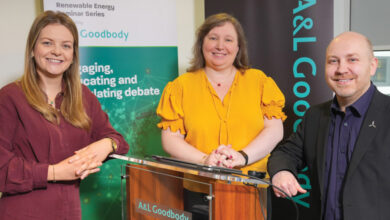Osborne on energy
At the recent Northern Ireland Energy Forum, the Chief Executive of the Utility Regulator, Iain Osborne was interviewed by journalist Jamie Delargy in front of an audience of senior managers and policy makers from the province’s energy sector.
Jamie Delargy
Can you sum up what you believe your main priority is over the coming year?
Iain Osborne
I think you have to start with what we’re for as the regulator. We’re the consumer champion. We protect consumers. We do it by exercising powers which make us the gate-keeper to future investment in this fundamentally important infrastructure sector, and we have a duty to make sure the energy industry can be sustained economically, but also environmentally and socially.
Having cleared away some of the disputes of the past, [that] has left us with the opportunities to make a paradigm shift. In electricity we have created the SEM [Single Electricity Market]. We’re now working on how common arrangements for gas will enable economies of scale to be captured. The all-island dimension remains very important. I think the other big thing that we’ll be focussing on is accelerating the development of retail competition. We will be publishing a consultation on our five year strategy next week and accelerating competition is an important part of that.
Jamie Delargy
I expected at this point we would be reacting to the Minister’s announcement. How important are these [energy] issues?
Iain Osborne
I think the big debate about energy policy is vastly important. The Utility Regulator has consulted on what we can do to improve the sustainability of the sector and our strategy on competition. But we are, in the biggest sense, just part of the delivery mechanism for Northern Ireland as a society.
At the moment we are the biggest carbon junkie in the UK and one of the biggest in Europe. We have the largest carbon footprint. If I had to summarise the presentation we just heard from Platts on energy prices, it would be that he doesn’t know either what the future looks like, but there are some straws in the wind that give a very serious pause for thought. Not necessarily over the next five years as we’re going through a global recession but over the next 20 years. All the drivers for me seem to be saying: “if you’re still a carbon junkie in 2028, you’re dead in the water economically” and I don’t think Northern Ireland has yet got a plan to get our arms round that. It’s a question of economic survival but it’s also a question of social justice – we’re a low-wage society and as of today there are many people who are having a very difficult time this winter because of high energy prices. We hope to get away from that situation where we’ve got many people who struggle economically. We have to get to grips with producing a sustainable energy system.
Jamie Delargy
People in government might be slightly surprised by that very stark analysis, the fact that we are carbon junkies and we haven’t got a plan to get ourselves out of that. Is it possible to formulate any strategy when economists haven’t really a clear handle on what’s going on and they aren’t clear on the impact the [energy price] drivers are having? In that situation, is it meaningful to talk about planning?
Iain Osborne
I think it certainly is. Particularly in a place like Northern Ireland, where we don’t have fossil fuel reserves of our own. We’re on the end of the delivery chain. Markets are only vulnerable to speculation if they are very tight. The question here is “what are the fundamentals doing?”
Demand growth may have the edge taken off in the next few years because of the recession but in the longer perspective it appears demand growth is going to continue strong and we’ve got a tightness in terms of ability of the industry to keep producing more oil. There was a piece in the FT on an International Energy Agency report saying, on the 2030 perspective, our ability to keep finding new reserves seems to be trailing off. It looks like the market is going to continue to be tight. So what’s the response to this? I think the response it to try to buffer as much as possible to protect ourselves from the global market.
At the wholesale level that means using our indigenous energy sources as much as we can and that means renewables – that doesn’t just mean wind. There’s an awful lot of energy from waste or methane capture that we should be doing.
And coming down the value chain, if we’re going to see prices affected by high volatility in global markets then you have to ask questions about where that risk should lie. In Northern Ireland for many years we have operated a system where all the risk passes to consumers. In return they don’t pay an insurance premium: the companies pick up very low margins. I think the experience of the last year or so, where we’ve seen such high levels of volatility, causes us to ask whether consumers would be better served by the suppliers bearing some of the procurement risk – accepting that if there is a risk it has a price – but if those risks are borne by the companies, who have the incentive and ability to manage them, then we might see them better managed over time.
Jamie Delargy
You seem to be saying we pay them more to get prices down. Now that seems to be a paradox there. We give them a higher margin to take on more risk, in the hope that by doing so they will be able eventually to drive down prices. Isn’t that an act of faith?
Iain Osborne
No, I don’t think it’s an act of faith. The risks have a price. You can choose not to insure your house. If you’re wealthy enough to rebuild it if it burnt down, then you don’t have to pay the insurance premium; or you can choose to pay the premium and that means your outgoings are higher. If there were nothing more to the problem than that, it would simply be moving money around the system and it wouldn’t make any difference. But if you place the risk with the people who have the ability to manage it effectively, it is likely actually to be better managed. I’m not saying you will take away all volatility but it does seem to dampen it. Great Britain has a system where suppliers bear the risk and what it produces is a system where you get buffering, a slower rise and even a slower fall as well. Of course, you have to make sure the wholesale market is operating effectively – and there are questions about the operation of the GB market. Ofgem has just published a paper on that, so you still need vigorous regulation. I’m not presenting this as a panacea but it could get you to the point where those risks are better managed by the people who have the ability to manage them.
Jamie Delargy
To be clear on that, it does mean higher margins for the companies?
Iain Osborne
Yes, it’s higher margins in return for less volatility, in the hope over time [of] a more effective management of that risk.
Jamie Delargy
What about Douglas McIldoon’s review of electricity prices?
Iain Osborne
The focus of the McIldoon review was first of all to say “did we make mistakes about the processes we went through leading to the September announcements?” and a whole set of other questions about how we might take such decisions in the future. I hope we are a learning organisation, and I would never have set the review up if I weren’t open to the possibility that we could do better in future.
But it’s not primarily about “is 33 per cent the right number?” I haven’t yet heard anybody tell us anything we did wrong. Maybe Douglas will point something out but even [with] people who have been asking questions about it, no-one’s ever said that we were out by 10 or 20 per cent. So if there are expectations that it should not be 33, it should be 10, then they need to be put to one side because that ain’t going to happen.
I think probably the greatest value we get from the review is to contribute to this wider conversation we’re having about what’s the future of energy policy for Northern Ireland? Last September is in the past. What is really important to my mind is that we’re developing a framework that is ambitious enough to cope with the scale of challenge that Northern Ireland faces.
Jamie Delargy
What about competition in the nondomestic sector? Is it working properly?
Iain Osborne
As a set of mechanisms it works. Do businesses have as much choice as I would like them to have? No.
This last year has been particularly painful for businesses just as it has for domestic customers. They had equally seen the pass-through of shocking levels of wholesale price and to some extent, because businesses very often buy at one time in the year, they are also exposed to having locked in at an unfortunate time. And, incidentally, none of that relates to regulatory decisions! It kind of reinforces the message that I do want people to get hold of – that this is about wholesale markets, chiefly outside Northern Ireland.
But we’ve heard from many companies that they only get a handful of people offering to them. If you’ve only got a handful in the market and one or two for whatever reason don’t want to offer – they don’t feel that that customer has got good enough meter data, they’re not quite sure what the demand will be, or they’ve only contracted for so much wholesale power and they’ve sold it all – so you lose one or two, customers can end up with insufficient choice. I don’t think that’s satisfactory. I think the work we’re looking to do to accelerate competition should be of benefit to the whole market, not just households.
Jamie Delargy
How does that compare with the South and across the water?
Iain Osborne
Northern Ireland is still a good deal more expensive than Great Britain or the Republic of Ireland and the reasons for that we understand. Some of it is about the legacy issues. We’re still paying for the PSO [public service obligation], although the PSO is lower than it has been for many years and when we re-set tariffs in September we evened it out. Businesses were paying more than their fair share of the PSO and we’ve addressed that. But we have some long term legacy issues that affect businesses as they have done for a number of years.
Jamie Delargy
To quote a joke economists love: “Look there’s a 10 pound note. No, it couldn’t be there because someone would’ve picked it up by now.” There’s something similar that applies to installing energy efficient equipment. It’s claimed that there is a free lunch simply by installing this then picking up the savings and yet it seems so few do it.
Iain Osborne
Well, I spent a good chunk of my career helping to run businesses rather than observing from an academic point of view. I worked in telecoms companies as we went through the rapid expansion in the late nineties and then the painful bust. So I’ve observed it first hand, that businesses tend to focus on the thing that’s most important to them at the moment – you know your cost base is rather high but you got other things to focus your management attention on. Some Northern Ireland businesses, particular the energy-intensive ones, have done a lot of work on energy efficiency over the years and amongst energy intensive sectors, stand up very well against comparisons. But the Carbon Trust tell me that in their experience very many Northern Ireland businesses can save 10, 20, or 30 per cent of their energy costs.
Jamie Delargy
Why don’t they believe that? If they did believe it they would do it.
Iain Osborne
In my mind energy efficiency is fundamentally important. Everybody acknowledges this. If you use less energy you produce less negative stuff: cost, pollution, investment need. It’s a continual challenge why it is so difficult to push this forward.
I feel particularly strongly about this as a business opportunity here. Northern Ireland desperately needs to grow its private sector. If you buy into the hypothesis that over the next generation we are going to have to work through not just our housing stock but all our offices and public buildings to substantially to produce a step change in their environmental performance, then there is an enormous business opportunity. Northern Ireland has a lot of businesses who have the capability to work on this.
Jamie Delargy
One of the things that I would like to deal with is the targets for renewable energy. It looks as if the UK will have to produce, by 2020, 50 per cent of its energy needs from renewable sources and that would translate probably into 40 per cent of electricity coming from renewable sources. In essence – wind. Are we on target to achieve that?
Iain Osborne
The first thing I would say is it’s not only about wind. Over half of renewable certificates in the UK come from capturing methane coming out of landfill sites or old coal mines and Northern Ireland does almost none of that. We don’t yet to my mind have a compelling plan to meet the challenge of waste disposal. Energy from waste, these days, is clean. We all remember 30 to 40 years ago when incinerators for waste would produce a lot of dioxins. That isn’t the case anymore and apart from anything else we’re at the same risk of getting into serious trouble over the Landfill Directive as we’ve been over the Urban Waste Water treatment directive over the last 10 years. We need a plan, and energy from waste is an important part of that plan.
So it isn’t all about wind but that is clearly very important. Those other sources, even if we maximise them, are still only going to give us a few percentage points of what we need. The very important study that DETI and its equivalent in the Republic sponsored recently showed us that we’ve got the wind resources. It’s not a free lunch. I think if you believed that fossil fuel prices are going to be at or below current levels forever then wind might be considered a more expensive option. If you don’t believe that, then it depends what you do believe, whether it will pay for itself or not. But it would improve our fuel security and buffer us from international markets.
It’s all about the economics: this is not really about preventing climate change. What the small population of Northern Ireland does is not going to make very much difference to whether the ice caps melt. But if the rest of the world acts on the assumption that we need to reduce energy consumption, reduce carbon – and if fossil fuel prices go up and up – then we have a major economic problem, as I said earlier. It’s not about saving the planet, it’s about saving our own skins. I do think there’s a need for a political debate.
At a technocratic level we can broadly see what we would need to do. We would need to substantially increase the grid capacity in the west. We’ve got quite a lot of planning applications coming through the system. We need to make sure people can hook them up. We might need to look at the basis on which people build tie-ins – maybe allow companies other than NIE to enter that.
But planning at a technocratic level is not going to deliver this. If there isn’t a consensus that we have to do this, we will get snarled up in the planning system and individual wind farms, when they’re negotiating with landowners, will find it very hard to get agreement. If you get everything else lined up, you’ll get people with placards preventing the diggers going in.
We’ve seen in Corrib how a lack of political consensus can hold up developments. It is essential that the big conversation that we need, and that the Minister is initiating, proceeds – because we need to get widespread buy-in to the economic actions Northern Ireland needs to take to save its own skin.





